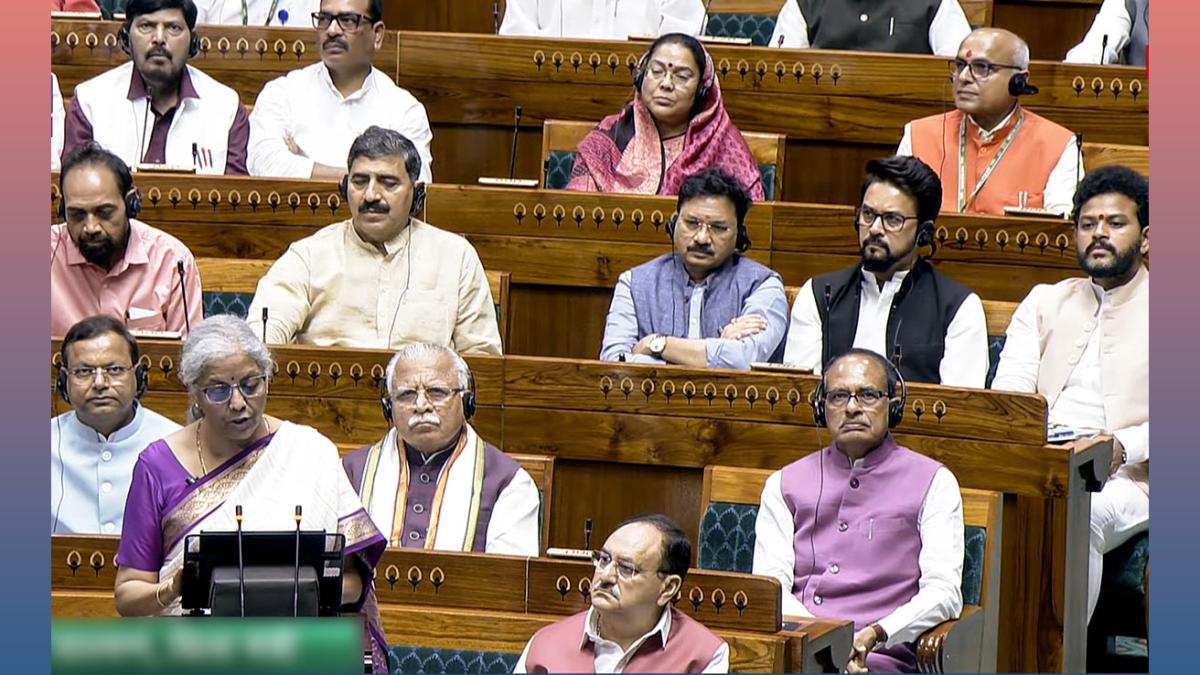UK Businesses React Positively to India's Union Budget
UK businesses and investors welcome India's Union Budget, praising the fall in corporate tax rates for foreign companies, abolition of Angel Tax and measures to boost foreign investment.

London, Jul 23 (PTI) The Union Budget tabled by Finance Minister Nirmala Sitharaman in the Lok Sabha on Tuesday has been received with much enthusiasm within the UK business and investor community, with the fall in the Corporate Tax rate for foreign companies from 40 to 35 per cent and the abolition of the "Angel Tax" among the stand-out proposals.
Announcements by the minister on India's fiscal deficit being on a downward trajectory, estimated at 4.9 per cent of GDP for this financial year, were among the aspects that experts feel would help boost foreign investor sentiment towards the economy. The country clocking an 8.2 per cent growth in the previous financial year and efforts to create jobs and enhance skills were among the other key highlights for UK business and industry.
Overall, I would say it's a positive Budget for the Indian economy. There have been some really positive measures, particularly on infrastructure and supporting the agricultural economy, said Anuj Chande, Partner and Head of the South Asia Group at Grant Thornton.
There were a couple of announcements which I think will help the UK-India corridor: one was the reduction in the Corporate Tax rate for foreign companies, which is excellent news. And, going the other way around, is the ability of Indian companies being able to use rupees for foreign investment. These will have a very specific impact on cross-border investment between the two countries, he said.
Richard McCallum, CEO of the UK India Business Council (UKIBC), described India as the most exciting economic story in the world right now with the Budget helping UK firms along their journey to work closely with the country as a strategic partner.
Corporate Tax reduction is a welcome step for UK companies to come and invest in India and the announcement around simplification of foreign direct investment (FDI) rules will make India a more attractive destination for global investors, said McCallum.
UK companies are eager to co-create and partner with India. I think India has probably the best ROI (return on investment) per dollar for R&D spend anywhere in the world; so we see this as a very positive step. And, skills and employability was a clear theme in the Budget...from a UK perspective, UK universities are looking at how to engage with India and I think that they can be part of the solution in terms of India's skilling requirement, he said.
For members of the Federation of Indian Chambers of Commerce and Industry (FICCI) UK's India Advisory Group, the Budget was pragmatic and purposeful in pursuing a growth agenda.
It is currently the fifth-largest economy and it's to become the third-largest economy and that can be achieved by doubling its current GDP to 7 trillion. The investment in mainly defence, rural development, agriculture and home affairs will all bring about a significant boost for jobs and also bring about opportunities for both FPI (foreign portfolio investments) and FDI (foreign direct investments), said Suchit Punnose, CEO of UK-headquartered Red Ribbon Asset Management, which has been investing in the Indian market for over 18 years.
We do believe that this Budget brings about the most conducive environment required to invest and now is a very good time to invest in the Indian economy, he said.
Another FICCI UK India Advisory Group member, Nadia Sood of fintech CreditEnable, was keen to highlight the Micro, Small and Medium Enterprise (MSME) aspects as a company that intermediates the credit market for such companies.
India's MSME sector is growing at a CAGR of 2.5 per cent...the move by the government to introduce Mudra Loans to increase the threshold from Rs 10 lakhs to Rs 20 lakhs, the introduction of Rs 100 crore credit guarantee scheme for manufacturing MSMEs and the strengthening of intermediation platforms that help facilitate access to finance I think are excellent moves, she said.
Schemes benefiting women and girls to help upskill them and introduce them into the labour market and help them develop entrepreneurial activities are also significant and important, added Sood, who recently worked with the NITI Aayog on a Digital Credit Readiness Programme for women entrepreneurs.
Prem Barthasarathy, Founder and Managing Partner of Pontaq a UK-headquartered venture capital fund operating in the India-UK corridor since 2015, feels the Budget would result in a lot more inflow of foreign capital.
He noted: With the Angel Tax gone we'll see a lot more investors wanting to invest and back innovative companies in the ecosystem without having to worry about a tax chit that comes later.
"This is important for the economy because we have about 12,000 plus patents that have been filed in the last few years, and that is only expected to grow; some of these R&D-based technology companies require a lot more initial capital and there will be a lot more investment coming in.
Announcements by the minister on India's fiscal deficit being on a downward trajectory, estimated at 4.9 per cent of GDP for this financial year, were among the aspects that experts feel would help boost foreign investor sentiment towards the economy. The country clocking an 8.2 per cent growth in the previous financial year and efforts to create jobs and enhance skills were among the other key highlights for UK business and industry.
Overall, I would say it's a positive Budget for the Indian economy. There have been some really positive measures, particularly on infrastructure and supporting the agricultural economy, said Anuj Chande, Partner and Head of the South Asia Group at Grant Thornton.
There were a couple of announcements which I think will help the UK-India corridor: one was the reduction in the Corporate Tax rate for foreign companies, which is excellent news. And, going the other way around, is the ability of Indian companies being able to use rupees for foreign investment. These will have a very specific impact on cross-border investment between the two countries, he said.
Richard McCallum, CEO of the UK India Business Council (UKIBC), described India as the most exciting economic story in the world right now with the Budget helping UK firms along their journey to work closely with the country as a strategic partner.
Corporate Tax reduction is a welcome step for UK companies to come and invest in India and the announcement around simplification of foreign direct investment (FDI) rules will make India a more attractive destination for global investors, said McCallum.
UK companies are eager to co-create and partner with India. I think India has probably the best ROI (return on investment) per dollar for R&D spend anywhere in the world; so we see this as a very positive step. And, skills and employability was a clear theme in the Budget...from a UK perspective, UK universities are looking at how to engage with India and I think that they can be part of the solution in terms of India's skilling requirement, he said.
For members of the Federation of Indian Chambers of Commerce and Industry (FICCI) UK's India Advisory Group, the Budget was pragmatic and purposeful in pursuing a growth agenda.
It is currently the fifth-largest economy and it's to become the third-largest economy and that can be achieved by doubling its current GDP to 7 trillion. The investment in mainly defence, rural development, agriculture and home affairs will all bring about a significant boost for jobs and also bring about opportunities for both FPI (foreign portfolio investments) and FDI (foreign direct investments), said Suchit Punnose, CEO of UK-headquartered Red Ribbon Asset Management, which has been investing in the Indian market for over 18 years.
We do believe that this Budget brings about the most conducive environment required to invest and now is a very good time to invest in the Indian economy, he said.
Another FICCI UK India Advisory Group member, Nadia Sood of fintech CreditEnable, was keen to highlight the Micro, Small and Medium Enterprise (MSME) aspects as a company that intermediates the credit market for such companies.
India's MSME sector is growing at a CAGR of 2.5 per cent...the move by the government to introduce Mudra Loans to increase the threshold from Rs 10 lakhs to Rs 20 lakhs, the introduction of Rs 100 crore credit guarantee scheme for manufacturing MSMEs and the strengthening of intermediation platforms that help facilitate access to finance I think are excellent moves, she said.
Schemes benefiting women and girls to help upskill them and introduce them into the labour market and help them develop entrepreneurial activities are also significant and important, added Sood, who recently worked with the NITI Aayog on a Digital Credit Readiness Programme for women entrepreneurs.
Prem Barthasarathy, Founder and Managing Partner of Pontaq a UK-headquartered venture capital fund operating in the India-UK corridor since 2015, feels the Budget would result in a lot more inflow of foreign capital.
He noted: With the Angel Tax gone we'll see a lot more investors wanting to invest and back innovative companies in the ecosystem without having to worry about a tax chit that comes later.
"This is important for the economy because we have about 12,000 plus patents that have been filed in the last few years, and that is only expected to grow; some of these R&D-based technology companies require a lot more initial capital and there will be a lot more investment coming in.
You May Like To Read
TODAY'S MOST TRADED COMPANIES
- Company Name
- Price
- Volume
- Vodafone-Idea
- 11.28 ( -0.70)
- 49134455
- Shish-Industries
- 9.16 ( -6.91)
- 44708485
- Sylph-Technologies
- 1.05 (+ 8.25)
- 29800622
- Welcure-Drugs-and
- 0.47 ( -2.08)
- 28655324
- Sunshine-Capital
- 0.27 (+ 3.85)
- 13474444






